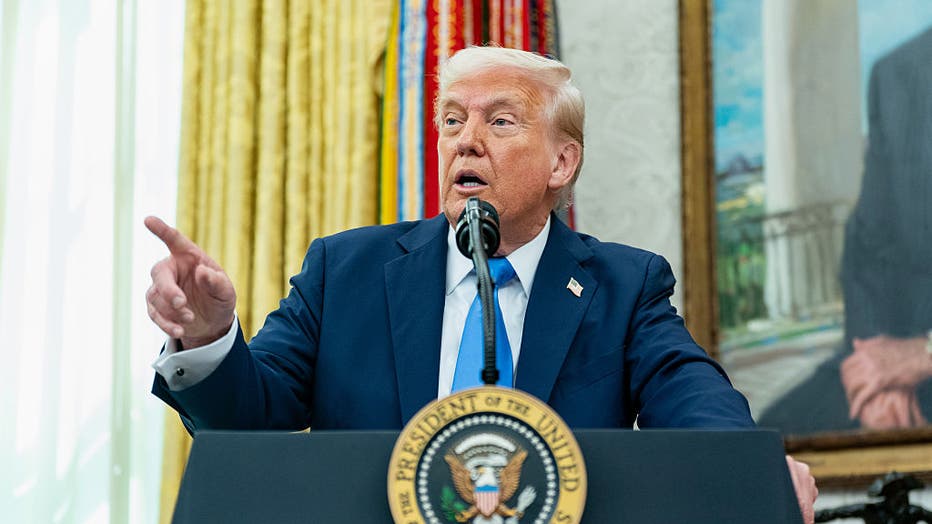What is a woman? Trump answers reporter's question

Reporter asks President Trump: What is a woman?
President Donald Trump took questions in the Oval Office on Friday, two days after taking part in a Women's History Month event. One reporter asked the president, "What is a woman?" Here's how he answered.
WASHINGTON - At a public event Friday, President Donald Trump offered four answers to a reporter who asked him to define what a woman is — a question that’s become politically charged as Republican-led states move to legally define sex based on birth and limit transgender rights.
The moment came as Trump introduced Alina Habba as interim U.S. attorney for the District of New Jersey. After praising Trump’s female appointees, the reporter asked why it matters to understand the difference between men and women — prompting Trump to respond with a mix of lighthearted and serious remarks that reinforced the policy stance behind his recent executive orders.
How Trump answered the 'What is a woman?' question
What we know:
President Trump first answered by saying, "A woman is someone that can have a baby under certain circumstances." He added, "A woman is a person who is much smarter than a man, I’ve always found," drawing laughter from the crowd.
He then said, "A woman is a person that doesn’t give a man even a chance of success," before ending on a more serious note: "A woman’s a person that, in many cases, has been treated badly," referencing transgender women participating in women’s sports. Trump called the practice "demeaning" and "very unfair."
His comments align with executive actions he’s taken to bar federal funding from schools that allow transgender women to compete in female athletic categories. Other recent policies under his administration restrict gender-marker changes on passports, bar transgender women from women’s federal prison facilities, and eliminate federal funding for gender-affirming care for minors.
What questions remain about Trump’s gender policies?
What we don't know:
While Trump has used executive orders to define sex as immutable and based on birth, legal challenges could determine how long those directives remain in place. Many of his actions will likely require legislation or agency rulemaking, which could take months or years and may face court injunctions in the meantime.

US President Donald Trump speaks during a swearing-in ceremony for Alina Habba, interim US attorney for New Jersey, not pictured, in the Oval Office of the White House in Washington, DC, US, on Friday, March 28, 2025. (Photographer: Bonnie Cash/UPI/Bloomberg via Getty Images)
It’s also unclear how far-reaching the impact will be on individual transgender Americans. For example, states may interpret or apply Trump’s orders differently, depending on local laws and how courts rule on challenges to gender recognition, healthcare, and sports participation.
What is clear is that Trump’s definition is becoming central to a growing legal and cultural fight.
Why this debate is spreading to the states
The backstory:
Following Trump’s executive orders, Republican-led states are moving quickly to define sex based on reproductive anatomy at birth. In Alabama, Gov. Kay Ivey recently signed a bill that says, "If the Good Lord made you a boy, you’re a boy. And if He made you a girl, you’re a girl." The bill passed the Alabama Senate 26–5 and is now advancing in the state House.
Similar laws are being proposed or advanced in Nebraska, Wyoming, Arizona, Indiana, Missouri, and South Carolina. Nebraska Gov. Jim Pillen signed an executive order and backs legislation to legally define male and female while restricting access to bathrooms and locker rooms based on birth sex.
Supporters argue the laws are about protecting "women-only" spaces and preserving fairness in sports. But critics — including Democratic lawmakers, transgender advocates, and medical groups — say the efforts are discriminatory and dangerous.
The American Medical Association and other major medical groups have pushed back, saying sex and gender exist on a spectrum and that laws enforcing rigid definitions ignore intersex people and well-documented scientific complexity.
The Source: This article is based on reporting from the Associated Press, including Trump’s remarks at the March 28 event and background from the AP’s February 7, 2025 story on transgender-related legislation. Quotes from state lawmakers and officials were originally published by the AP. No external commentary or opinion has been added. This article was reported from Los Angeles.

